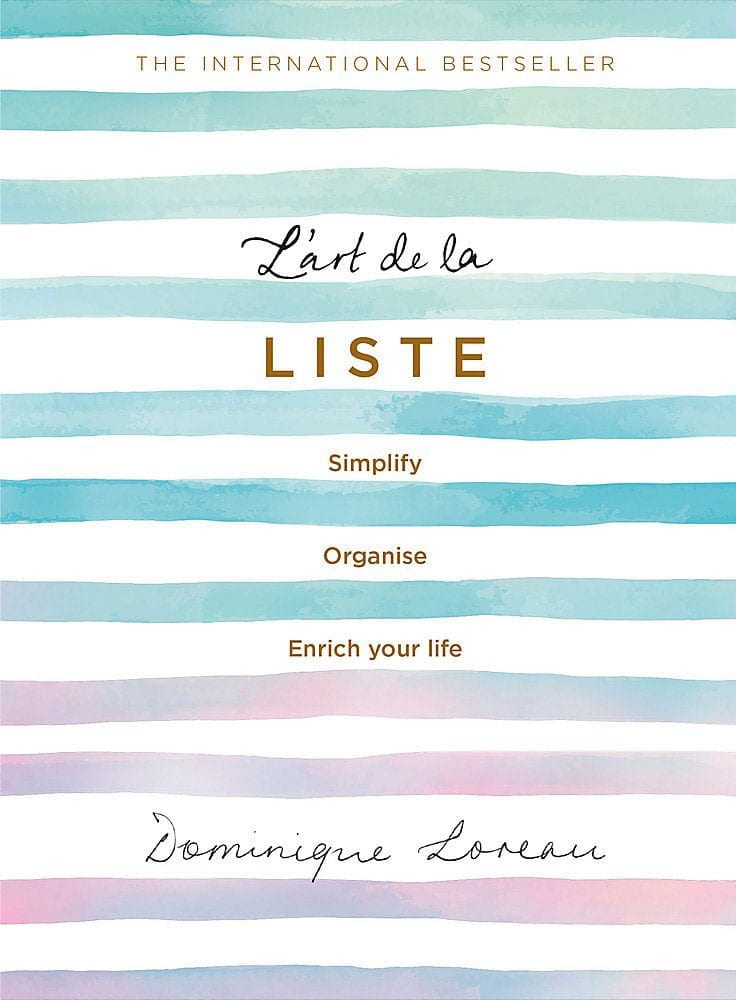I start every working day the same: writing a to-do list at my desk while sipping a green tea. And I mean every single day. I may have failed with other organizational methods, but I feel entirely lost without my lists. So much so, that I have a sinking feeling in my stomach when I can’t locate my notebook.
Beyond my daily to-do list, I have a weekly to-do list, monthly to-do list, and often halfway through the day, I scrap the first to-do list for a fresh one. If I am on-the-go and unable to scribble, I resort to making lists on my phone. (I believe there is nothing more intrusive, or insightful, about a peek at the lists in someone’s phone notes). And it is not just work-related lists but personal stuff, too: books I have read, countries I want to visit, quotes to remember, achievements I am proud of, reasons not to text my ex-boyfriend.
I am not alone in my love of list-making. In fact, the art of penning lists is having a bit of a moment. “L’art de la Liste: Simplify, Organise and Enrich Your Life,” the best-selling French book by Dominique Loreau, has now been translated into English. Decades living in Japan taught Loreau the benefits of organized life, and how carefully considered lists play a fundamental part.
According to The New York Times, Loreau’s practical guide has sold 65,000 copies in France since its release in 2008, and spent months on the top 10 best-seller list. Much like the recent trend for decluttering, it seems more of us are fascinated with ways to bring order and organization into our lives than ever before. “[Lists] allow you to reorder yourself, to evolve, to tame silence and solitude, to simplify life and give it more value. And what could be more gratifying or more effective than doing something by yourself and for yourself?” Loreau writes in “L’art de la Liste.”
And it is definitely gratifying — lists help me plan my workload, create a sense of control and I never tire of that satisfying feeling of crossing something off. The experts I spoke to agree; list writing has a plethora of benefits, especially in moments of stress or overwhelm. “Lists allow us to clarify our thoughts and take the weight off our minds. Zen philosophy counsels us to abide by forms in order to liberate ourselves from them and achieve freedom. Lists are that form. They will give you more lucidity and more ease in everyday life; they will hugely enrich every sphere of your life,” Loreau continues in her book.
“People can often feel swamped with so much to do, which leads to procrastination, avoidance and stress. Writing lists is a great way to clear your mind, and get the thoughts out of your head and down on paper,” says well-being coach Kamran Bedi. From a psychological standpoint, it can also be mentally freeing to pen thoughts and tasks to paper. Worries or thoughts take up cognitive resources, but once these are expelled onto paper, you are freer to work on the task at hand. “Sometimes it’s easier to action your thoughts by writing. Keeping everything in your head can build confusion and create toxic cycles of doubt and uncertainty,” says life coach Elisabetta Franzoso.
Writing a daily gratitude list helps you consciously focus on what’s good in your life, and can really shift your thinking.
And often, the process of writing a list tackles procrastination head-on and subsequently boosts productivity. “We often put off the things that we need to do because we don’t know where to start. If we simply think it through, then we can get distracted. A list motivates us to act,” Bedi says. And having a clear list of tasks can help you plan your time better. “Becoming organized is a byproduct of list-making,” Mihaela Berciu, mindfulness and leadership coach, points out. “Once you have a list of tasks in front of you, you can organize them into time blocks, allocate slots in your diary to fulfill them, or create an itinerary for your day based on priorities and deadlines,” she suggests.
While traditionalists like myself may favor the old-fashioned notebook, there is no obvious advantage of paper lists over digital ones. “It’s the process — not the medium — that’s important. A digital list is just as effective as a paper one,” Bedi points out. What matters is that you set aside time to make the list.
Beyond their role in organization and ability to boost productivity, lists can instill a positive mindset. I have personally found the concept of creating “done” lists just as effective as “to-do” lists. You can even make a gratitude list, which comes with its own set of well-being benefits. “Taking time to write a daily gratitude list helps you become aware of the daily good or joy, be it large or small,” Bedi says. “The process encourages you to consciously focus on what’s good in your life, and can really shift your thinking,” he adds. Berciu echoes this, emphasizing the value in seeing the upside to situations you are presented with. “It’s very easy to fall into the trap of being a victim in your own life, and wallow about how unfortunate you are. But if your mind is trained to look for things to be grateful for, bad experiences become a reason to smile and appreciate the learning.”
While this is often easier said than done, a list is a good first step. As Berciu says: “It starts with a list, but it goes so much further.”
Expert-approved tips for making better to-do lists:
- Check your calendar and realistic availability. Always avoid unachievable deadlines.
- Create a system for identifying tasks that are a priority. Consider rewriting your list in number order or using a color code (e.g. red for urgent).
- If you have the time and are feeling inspired, consider incorporating creative elements to your lists such as drawings or color.
- Visualize what completing the list will feel like. Imagine the relief, the pride and the sense of accomplishment.
- Be kind to yourself. Praise yourself and your efforts as you complete each task.
- Reevaluate the list as you progress through it. Reassess whether the list is realistic and remove tasks that are no longer relevant or beneficial.
We only recommend products we have independently researched, tested, and loved. If you purchase a product found through our links, Sunday Edit may earn an affiliate commission.








